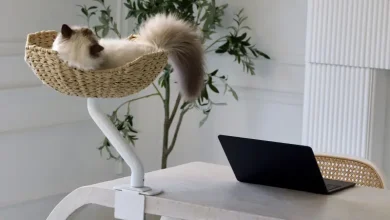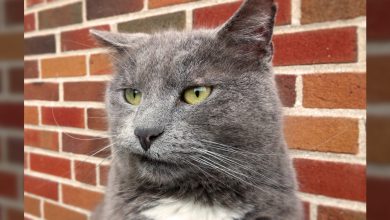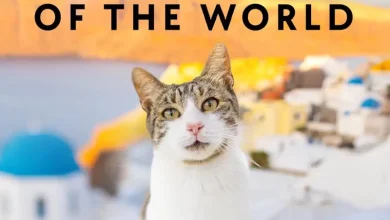
Cat anatomy is endlessly fascinating to me. Cats have some distinctive anatomical talents that they share with no different species, and that is true for his or her tongue as effectively. That sandpaper sensation is attributable to what’s considered one of nature’s excellent designs: the cat’s tongue permits her to groom and to eat her prey.
Anatomy of the cat’s tongue
The cat’s tongue is roofed with tiny, backward dealing with barbs referred to as papillae. These papillae are comprised of keratin, the identical substance that’s present in human fingernails. These papillae account for the tough sensation you are feeling when your cat licks you. They’re designed to assist the cat accumulate filth, particles and and free hair from her coat whereas grooming. In addition they assist the cat pull meat off her prey’s bones.
Alexis Neol, a researcher at Georgia Tech, was so fascinated by her cat Murphy’s tongue that she determined to review cat tongues by making a mannequin that replicates the tiny barbs. She scanned a specimen of a cat tongue and 3D printed out the construction at 400 p.c scale.
Staying clear is a matter of survival
The cat’s tongue is a extra environment friendly grooming device than any comb or brush. The person spines are even formed like miniature cat claws with a really sharp finish,” Noel stated. “They’re in a position to penetrate any form of tangle or knot, and tease it aside.” Noel then put the synthetic cat’s tongue by way of it’s paces inside a machine that drags the mannequin throughout a patch of faux fur. To wash a standard hair brush, you should pluck the hairs out from between the bristles. Noel’s cat tongue mannequin was a lot simpler to wash: She merely ran her finger throughout the floor in the identical path because the spines. (Supply: PBS Newshour)
Despite the fact that our home cats don’t have to make use of their tongues to drag meat off their prey, you’ll nonetheless discover them grooming completely after every meal. Put up meal grooming is a remnant of cats’ wild origin, the place staying clear is a survival technique: eradicating all traces of the scent of her meal will forestall different prey within the space to be alerted to the cat’s presence, and also will forestall potential predators from scenting the cat.
Grooming additionally helps the cat maintain cool in scorching climate.
Grooming for consolation
Grooming may also be a self-soothing mechanism. Some cats will resort to grooming once they’re nervous or anxious. Sadly, this conduct is usually taking to such an excessive that they are going to groom off all their fur on components of their physique. This extreme grooming can also be referred to as psychogenic alopecia (alopecia means hair loss). Cat guardians typically don’t really see the cat doing this, they only discover the bald patches. The reason for extreme grooming will be bodily or behavioral.
The tongue helps cats drink
The tongue can also be instrumental in serving to cats drink. A couple of years in the past, researches at MIT performed a examine into the bodily dynamics of how cats drink. They studied high-speed video of cats to indicate how they flick the floor of water with the topside of the tip of their tongues. Based on the researchers, the highest floor of the cat’s tongue is the one floor to the touch the liquid. Cats, in contrast to canines, aren’t dipping their tongues into the liquid like ladles. As an alternative, the cat’s lapping mechanism is much extra refined and chic. The graceful tip of the tongue barely brushes the floor of the liquid earlier than the cat quickly attracts its tongue again up. Because it does so, a column of liquid varieties between the transferring tongue and the liquid’s floor. The cat then closes its mouth, pinching off the highest of the column for a pleasant drink, whereas maintaining its chin dry.
Cats can’t style sweets
Cats have fewer style buds than people, and so they can’t style sweets. For these cats that do like sweets, this behavior has most certainly been created by feeding species-inappropriate meals which might be too excessive in carbohydrates and sugars.
Picture Pixabay



